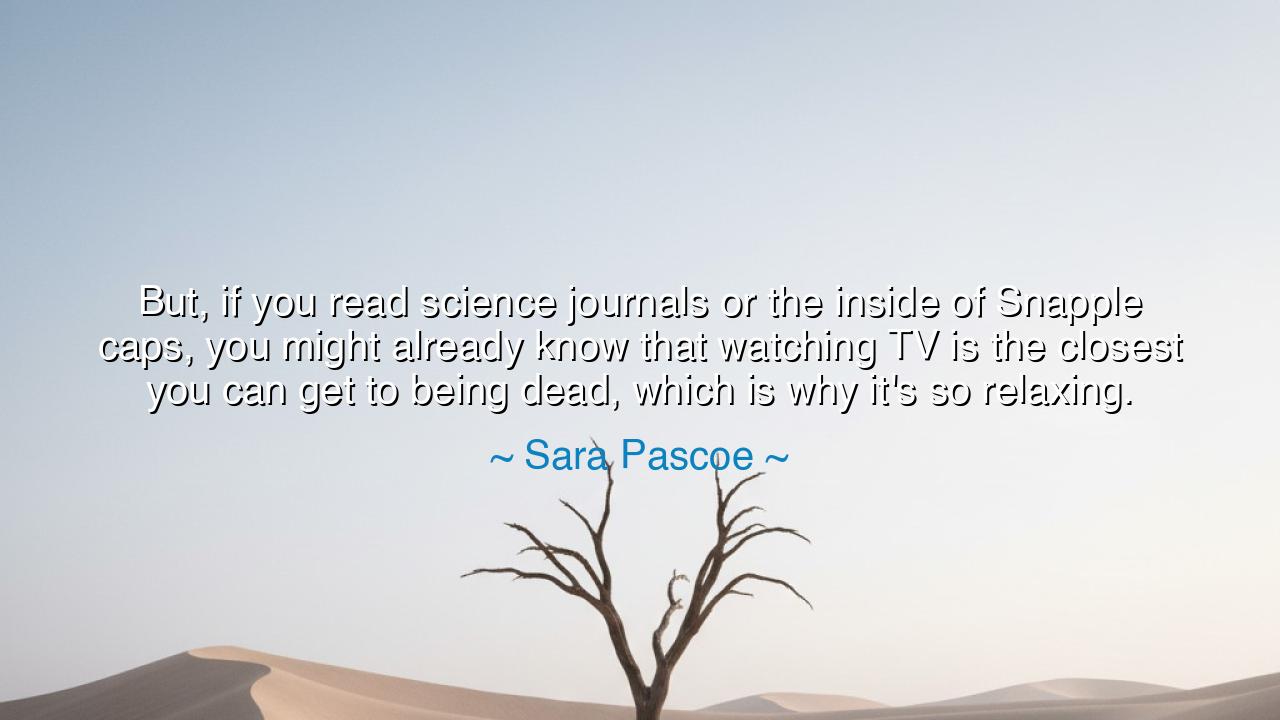
But, if you read science journals or the inside of Snapple caps
But, if you read science journals or the inside of Snapple caps, you might already know that watching TV is the closest you can get to being dead, which is why it's so relaxing.






"But, if you read science journals or the inside of Snapple caps, you might already know that watching TV is the closest you can get to being dead, which is why it's so relaxing." These words, spoken by the witty Sara Pascoe, carry a truth wrapped in humor and deep irony. In this modern age, where distraction and entertainment are readily available in endless streams, Pascoe's observation strikes at the heart of how we, as a society, have come to view rest and relaxation. The statement suggests that, in a paradoxical way, the very act of watching TV—an activity many consider to be a form of relaxation—can be equated to a state of near-death, where the mind is dulled and the spirit is detached from the world. It is in this state of relaxed passivity that we often find ourselves seeking solace, only to realize that in doing so, we may be sacrificing our vitality, our engagement with life.
The ancient philosophers were deeply aware of the balance between action and rest, and they understood that true rest comes not from retreating into passive states, but from engaging in meaningful activities that restore the soul. Aristotle, in his work on ethics, taught that the good life is one that balances both active engagement with the world and moments of rest that nourish the body and mind. But even in his time, the notion of relaxation was far from idle—true rest, he believed, is found in pursuing activities that align with our higher purpose, in nourishing our intellectual and moral faculties, not in the escape from life itself.
Pascoe’s quote speaks to the modern trap of disengagement—the act of retreating into the comfort of the screen, allowing ourselves to be lulled into passivity. Television, in its myriad forms, offers a distraction from the demands of life, a retreat into a world that is both fake and comforting. The mind, instead of being challenged, is soothed, but at the expense of its vitality. To sit before the screen, mindlessly consuming content, is akin to entering a state of detachment, as though one is slipping closer to the edge of life itself. In the ancient world, passivity was often seen as a vice—an inability to engage fully with the world and with our own potential. The great stoics, such as Seneca, believed that the key to a fulfilling life was to act with purpose, to be present, and to cultivate the inner strength to shape one’s own destiny. Idle distractions, they warned, rob us of this power.
Consider the story of Socrates, who rejected the comforts of the physical world in his pursuit of wisdom. Unlike many of his contemporaries, Socrates did not seek relaxation through physical indulgence or idleness. Instead, he found his greatest joy in the pursuit of truth, in conversation and reflection. His life was a testament to the idea that true rest comes not from escaping into the mindless distractions of the world, but from engaging deeply with the world and with the mind itself. Socrates would argue that in moments of passivity, such as those found in the comfort of the television screen, we are not only wasting our time but allowing our faculties to atrophy, losing the opportunity for true mental and spiritual growth.
In Pascoe’s words, we find a call to action. The mind and body, when in a state of stagnation, are not at rest but at risk. Rest, in its highest form, is not an escape from life, but a rejuvenation through meaningful reflection, engagement, and action. The great minds of history did not rest by retreating from the world, but by immersing themselves in it. They sought wisdom, understanding, and the engagement of their minds with the complexities of life. Whether it was Da Vinci, whose mind was constantly at work, even when resting his body, or Einstein, who saw the world through the lens of science and curiosity, the true rest they sought was found in their pursuit of knowledge.
The lesson here is not to forsake relaxation altogether, for rest is necessary to maintain the vitality of body and mind. But we must understand that relaxation cannot come at the cost of disengagement. In seeking to rest, we must seek forms of rest that renew and recharge us—not by numbing the mind or retreating into the false comforts of passivity, but by engaging with the world in ways that nourish us, challenge us, and leave us fulfilled. Just as the ancient philosophers encouraged active engagement with life, so must we find balance in our own pursuit of rest.
In your own life, when you seek rest, ask yourself: Is it the rest that comes from active reflection and engagement, or is it a retreat into the false comfort of distractions? Rest is vital, but it must be restorative, not numbing. Let Socrates’ wisdom guide you: engage with life, explore new ideas, and rejuvenate through meaningful reflection, not passive escape. The danger of distraction lies not in the act itself, but in the gradual erosion of the mind’s capacity to act, to create, and to contribute to the world. Let us, then, strive for a rest that invigorates us, not one that numbs the essence of our being.






AAdministratorAdministrator
Welcome, honored guests. Please leave a comment, we will respond soon